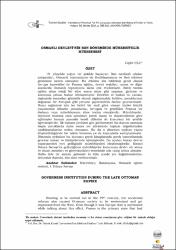| dc.contributor.author | Ulu, Cafer | |
| dc.date.accessioned | 2022-05-11T14:32:23Z | |
| dc.date.available | 2022-05-11T14:32:23Z | |
| dc.date.issued | 2014 | |
| dc.identifier.issn | 1308-2140 | |
| dc.identifier.issn | 1308-2140 | |
| dc.identifier.uri | https://app.trdizin.gov.tr/makale/TWpZMU1UTTBOQT09 | |
| dc.identifier.uri | https://hdl.handle.net/20.500.11776/7514 | |
| dc.description.abstract | 19. yüzyılda yoğun bir şekilde başlayan Batı merkezli ıslahat çalışmaları, Osmanlı toplumunun da Batılılaşmasına ve Batı etkisine girmesine neden olmuştur. Bu etkiden söz edilirken genel olarak Avrupa kastedilse de Fransa eğitim, devlet teşkilatı, sanat ve diğer alanlarda Osmanlı toplumunu daha çok etkilemiştir. Batılı tarzda eğitim alma isteği bir süre sonra onlar gibi yaşama, giyinme ve konuşma çabası haline dönüşmüştür. Devletin ve halkın bu çabası, toplumda sonradan görmelik olarak algılanmakla birlikte, çocuklarının doğuştan bir Avrupalı gibi yetişme gayretlerinin önüne geçememiştir. Bunu sağlamak için ise belirli bir mali güce ulaşan kişiler küçük yaşlarından itibaren çocuklarını, Avrupalı ve genellikle Fransız bir dadının veya mürebbiyenin eline teslim etmişlerdir. Mürebbiyeler, beyinleri bomboş olan çocukları kendi inanç ve düşüncelerine göre eğitmişler bunun yanında kendi dillerini de kusursuz bir şekilde öğretmişlerdir. İlk bakışta problem gibi görünmeyen bu durum zamanla başta çocuklarda daha sonra ise ailelerinde toplum değerlerinden uzaklaşmalarına neden olmuştur. Bu da o dönemin toplum yapısı düşünüldüğünde bir takım bozulma ya da kopuşlarla sonuçlanmıştır. Dönemin aydınları bu durumu gerek kitaplarında gerek hatıratlarında gerekse roman ve hikâyelerinde işlemişlerdir. Bu açıdan bakan devrin yazarçizerleri yeri geldiğinde mürebbiyeleri eleştirmişlerdir. Birinci Dünya Savaşı'na gelindiğinde mürebbiyeler konusunu devlet ele atmış ve onları zararları ve güvensizlikleri temelinde sıkı takip altına almıştır. Hatta öyle bir zaman gelmiştir ki ülke içinde yer değiştirmelerine, istisnalar dışında, izin dahi verilmemiştir | en_US |
| dc.description.abstract | Starting to be carried out in the 19th century, the occidental reforms also caused Ottoman society to be westernized and get impressed from the West. Even though it was Europe that is mentioned while talking about this effect, France is the primary state that hadinfluence on Ottoman society with regards to education, state organization, art and other areas. After a while, the demand for receiving education in western style turned into an effort of living, dressing and speaking like them. As it was seen as ignorantness this attitude of the government and the community, the efforts for raising children as if they are native Europeans could not be prevented. And for providing this, people with financial power hired European and especially French nannies or governesses for their children by their tender ages. Governesses educated the children who are ready to learn anything, in accordance with their beliefs and notions, and taught their own languages to these children perfectly. Not seeming as if a problem at first; with this, the families and especially the children started to be alienated from the social values. Considering the social structure of that era, this resulted in some social deteriorations and disengagements. The intelligentsia of the period treated this either in their books or in their novels and stories and they criticized the governesses when appropriate. Government handled the subject of governesses and followed them closely with regards to harms they gave and their undependability. Moreover, the government did not even give permission for them to change their places in the country with only some exceptions. | en_US |
| dc.language.iso | tur | en_US |
| dc.rights | info:eu-repo/semantics/openAccess | en_US |
| dc.title | Osmanlı Devleti'nin Son Döneminde Mürebbiyelik Müessesesi | en_US |
| dc.title.alternative | Governess Institution During the Late Ottoman Empire | en_US |
| dc.type | article | en_US |
| dc.relation.ispartof | Turkish Studies (Elektronik) | en_US |
| dc.department | Fakülteler, Fen Edebiyat Fakültesi, Tarih Bölümü | en_US |
| dc.identifier.volume | 9 | en_US |
| dc.identifier.issue | 1 | en_US |
| dc.identifier.startpage | 595 | en_US |
| dc.identifier.endpage | 610 | en_US |
| dc.institutionauthor | Ulu, Cafer | |
| dc.identifier.trdizinid | TWpZMU1UTTBOQT09 | en_US |



















